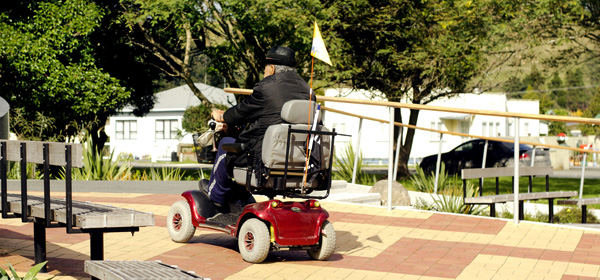The National Party is determined to reduce the maximum speeds of mobility scooters after the wife of Senator John Williams was hit by one of the vehicles.
Mr Williams secured overwhelming support at the party’s federal conference to push for mobility scooters to be speed limited to six kilometres per hour.
Mobility scooters currently have a maximum speed limit of 10 kilometres per hour, roughly the same speed as a person jogging.
At last week’s federal National Party conference, Mr Williams passed a motion calling for the lower speed limit and a maximum weight of 150 kilograms for the scooters.
In early August, Mr Williams’ wife, Nancy Capel, was struck by a scooter in regional NSW and suffered injuries that required a total hip replacement.
“[She] took literally one step out of the office and the gopher hit her,” Senator Williams told ABC radio after the accident.
“One of the staff looked out and all she saw was Nancy literally airborne and she landed on her left hip and just smashed her left hip to pieces.”
Senator Williams argued the drivers do not need a licence, insurance or medical checks to ensure they are physically and mentally well enough to be behind the wheel, and the lower speed limit would reduce the risk of accidents.
Deputy Prime Minister Barnaby Joyce has thrown his support behind greater regulation for scooters, while emphasising that he did not want to see a ban introduced.
The move for greater regulation of scooters has come under fire for punishing seniors and people with a disability.
Read more at abc.net.au
Opinion: Reactive move will disadvantage seniors
We all feel sympathy for Senator Williams’ wife after her run-in with a mobility scooter, however, good policy should be based on exhaustive research, and not appear to made on the run.
The National Party’s push to reduce the speed limit on scooters and push for a maximum weight limit smacks of policy on the run, with nary a thought for the impact it could have on those with mobility issues.
Taking one anecdotal accident with a Senator’s wife is no way to properly judge whether there is a problem that needs to be fixed.
Incredibly, the people most likely to be affected by any change to scooter regulations are those the Nationals claim to represent, the people living in rural and regional areas.
Dropping the maximum speed limit by four kilometres an hour might not seem like a lot in the city, but in regional areas where the distance people need to travel can be far greater, this will have a major impact.
The push by the Nationals to ban the larger models will also hurt their core constituency the hardest, with those larger models much more appropriate for the distances covered and the rougher terrain encountered in rural areas.
The current legal top speed is equivalent to jogging and already limits individuals who rely on these devices to commute.
To reduce the speed further will unnecessarily place vulnerable users at risk as it will take longer for them to travel to their required destination.
The Nationals’ policy will also have a profound impact on motorised wheelchair users as they fall under the same regulations as mobility scooters. Their policy will mean Australia will have the most draconian regulatory environment in the world for such devices.
Worse still is the fact that it will lead to much higher prices for scooters.
According to Assistive Technology Suppliers Australasia, there are no local producers of mobility scooters, with all of the vehicles being imported. As Australia only represents two per cent of the global market, manufacturers are unlikely to build specific models to suit the new regulations.
The vast majority of motorised mobility users are doing the right thing, and the Nationals must produce more than one anecdotal example to prove that increased regulations are necessary.
What do you think? Do you think motorised mobility devices should be better regulated? What changes would you like to see?
Related articles:
Perry on limited mobility travel
Travelling with limited mobility
Five tips to manage your mobility

